THE SPIRIT OF
Spinoza
Healing the Mind
Neal Grossman
With a Foreword by Huston Smith
ICRL Press
Princeton, New Jersey
THE SPIRIT OF SPINOZA: Healing the Mind
By Neal Grossman
Copyright 2003, 2014 by Neal Grossman
ISBN: 978-1-936033-12-6
This is a revised edition of Healing the Mind: The Philosophy of Spinoza Adapted for a New Age , originally published by Susquehanna University Press in 2003.
All rights reserved, including the right to reproduce this book or portions thereof in any form whatsoever. For information address:
ICRL Press
211 N. Harrison St., Suite C
Princeton, NJ 08540-3530
TABLE OF CONTENTS
List of Exercises

FOREWORD
N eal Grossman was a student of mine while I was teaching at MIT, which means that I have known him for forty-some years. Only during the latest of these years, however, did he tell me of an experience that dates back to when he was fifteen or sixteen years old, one that I find so prescient of the book in hand that I can think of no more appropriate way to open this foreword than to relate it.
Neal was exploring the streets of Boston one summer afternoon when he found himself passing its public library, and with nothing better to do he entered. Dazed by its seemingly endless corridors of books, he wandered down one of them, and there his eye fell on Platos dialogues. He had heard of Plato, and to satisfy his curiosity he pulled the book from its shelf, took it to a reading table, and let it fall open. Mirabile dictu , what then greeted him was the most famous passage in all of the dialogues, the Allegory of the Cave, which together with Moses vision of Mount Sinai in flames, is one of the twin foundations of Western civilization. When he came to the end of the allegory with its moral that education is not what most people take it to be, but instead should be to put true knowledge into souls that do not possess it, as if inserting vision into blind eyes, he found that tears were streaming down his cheeks.
When Grossman reported that episode, I heard it as a harbinger of the book in hand, but to bring out the full force of that book I need to say something about the years that intervened between the afternoon I have recounted and the writing of this book.
Innately intelligent and in search of truth, which our culture assumes can be most assuredly found in science, Grossman entered M.I.T., where his undergraduate major was physics. That institute requires its undergraduates to take 20 percent of their courses in humanities and the social sciences, which led him to my two courses on world religions. There he found echoes of Platos idea of a domain more ultimate than the physical universe, and he staked out as his lifes project to investigate whether the concept of a transcendent reality was compatible with our best scientific understanding of the world. To qualify for it he entered the then-strongest graduate program in history and philosophy of science in the country, at the University of Indiana, and when his doctorate was in hand the University of Illinois at Chicago hired him to teach that subject. Ten years later, having satisfied himself with regard to the basic compatibility of physics and spirituality, he lost interest in the philosophy of science per se and turned to teaching those philosophers whose first ambition was to change peoples lives.
This book, originally entitled Healing the Mind , is the first printout of that switch in his career and, to put the matter bluntly, it is one of the very few books that makes me regret that I am not still in the classroom where I could teach from it. It has taken its author a decade to get it published, for it falls between two stools. Academic presses wouldnt touch it, even though Spinoza scholars gave it flying colors for its understanding of Spinoza, but because of its New Age mentality and the exercises Grossman includes to open readers to where Spinozas ideas can enter the lives they are actually living, thus effecting the improvement that Spinoza hoped for. Meanwhile, New Age presses all assumed that Spinoza was too heady for their audiences. Had Grossman compromised on either of these fronts, this book would have been issued years earlier, but true to the books message, its author refused to compromise, even if that meant that his book would never be published. That it has been published warrants our thanks to both its principled author and its publisher, who saw the promise in Grossmans deft handling of the splice between ideas and their impacts on life.
This Foreword could appropriately end here, but my own love for Spinoza leads me to extend it to point out the exalted character of this books subject.
Spinozas given name was Benedict, which is the Latinized equivalent of the Hebrew baruch , meaning blessing or benediction. (Latin was the intellectual language of Spinozas Europe and the one in which he wrote.) This makes his name translate into English as Blessed Spinoza. No epithet was ever more appropriate, for as Bertrand Russell pointed out in his History of Western Philosophy , Spinoza is the noblest and most loveable of the great philosophers. This is true, but it leads to what I have elsewhere dubbed the Spinoza anomaly, which is: Why is Spinoza so loved and respected but little followed? Today there are Platonists, Thomists, Kantians, and Wittgensteinians, but few if any philosophers who call themselves Spinozists.
There is an easy way to resolve this anomaly, which I shall note only to put it behind me. According to this superficial resolution, Spinoza is loved because his life was exemplary, and he is not followed because his metaphysics is thought to be mistaken. If he was not mistaken in trying to construct a metaphysical system in the first place, as many philosophers today would contend, he was clearly mistaken in the way he went about devising it. Given the excitement attending the birth of modern science in the seventeenth century, we can understand why the geometrical method excited him, but too much has happened in the three hundred years that have followed to allow us to take it seriously. Geometrics have become multiple, logic turns out to be dead-end in paradoxes, and all efforts to find bedrock foundations on which logics ladder might be planted unshakablyfoundationalismhave led to quicksand. Percepts shift with their contexts (Gestalt psychology), facts reflect the theories that sponsor them (science and cognition generally), and there appear not to be any elementary particles from which nature is constructed (particle physics).
I call the foregoing resolutions of the Spinoza anomaly superficial because they trivialize the truth component in what we esteem, a move that is particularly unseemly for philosophers. It assumes that the not-less-than-holy life Spinoza lived was unrelated to the truth he saw. (Not-less-than-holy; I will fill in that epithet. By birth a man in exile and by temperament a recluse, Spinoza showed not the slightest bitterness in the face of the centuries of persecution his people had suffered and his excommunication by his own Jewish community in Amsterdam. Whatever the matter at hand, he always brought to it a mind free of attachment to self, party, or nation.) Or, if we prefer to hew to the cognitive grounds for our admiration of him, it assumes that coherence alone suffices to win our respect, whereas outside the formal sciences we know that it does not suffice if it did we would honor paranoids, for their logic tends to be impeccable; it is their premises that are out of touch with reality. To reduce metaphysics to a game well played is to rob it (and ultimately all philosophy) of its basis and importance. The mind that is fed wholly with joy unmingled with sadness ( On the Improvement of the Understanding ) is not a mind applauding a logical victory. We need an explanation of the Spinoza anomaly that avoids the travesty of disjoining the respect we accord a philosopher from the question of whether he was right.


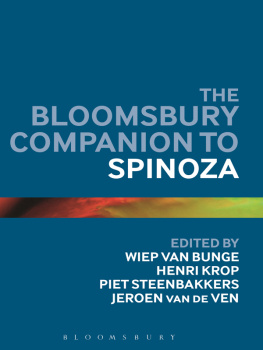
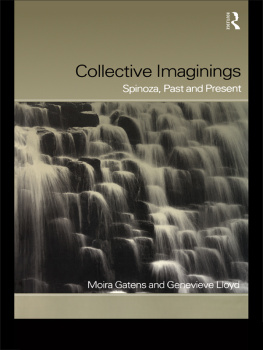

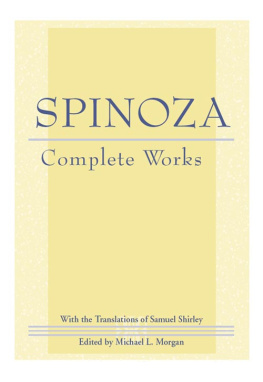
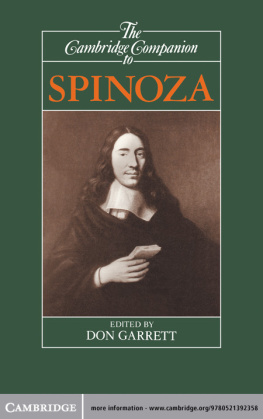

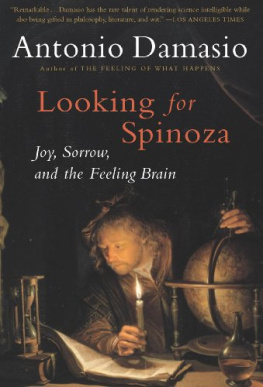
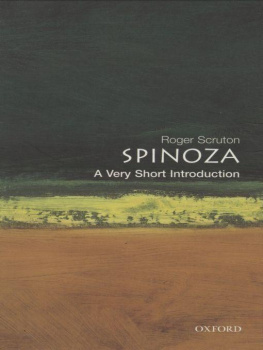
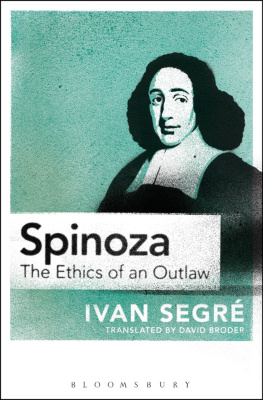
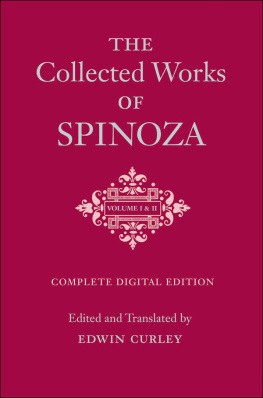


 FOREWORD
FOREWORD